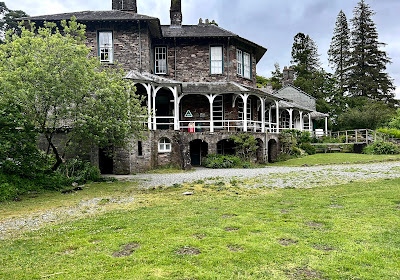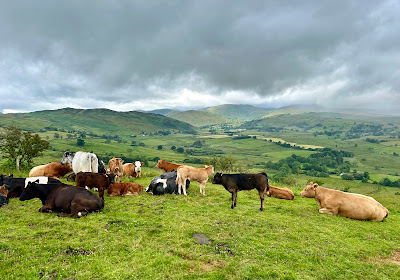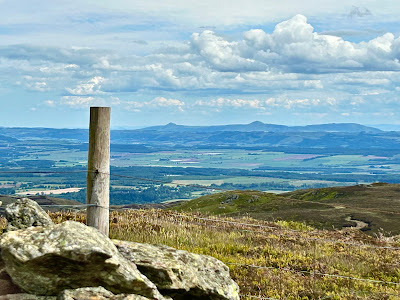 |
| Stone Arthur Summit |
 |
| Grasmere from the Stone Arthur Path |
 |
| Michael Nook Beck |
 |
| High Close Youth Hostel |
Sunday, 30 June 2024
KY is me and Q4 the period of my life to enjoy friendship, amazing places, mountains and to observe political and economic shenanigans
 |
| Stone Arthur Summit |
 |
| Grasmere from the Stone Arthur Path |
 |
| Michael Nook Beck |
 |
| High Close Youth Hostel |
 |
| Matterdale from Little Mell Fell |
 |
| Jenga: the government's operation mode |
Rishi Sunak's general election is the mistake that keeps on giving. I had predicted a summer election to some colleagues in May, and they guffawed, but I did not have the gumption to make a bet. And that is my problem, the UK has become a government-franchised casino where aspiring neo-capitalists make money on their phones without ever producing anything. I still live in a world where price, outcomes and community benefits are what matters.
Think about it. Government procurement of nuclear power stations, HS2, hospitals, PPE equipment, Test and Trace and consultancy advice for outsourcing services has been a bonanza for unscrupulous middlemen (and women) who have driven up inflation on facilities and services. These used to be delivered by local democratic bodies that were more prudent and focused on getting the best cost, and on-time delivery whilst supporting local businesses. Only 10 of the 40 hospitals promised by Boris Johnson have made progress, HS2 has been cancelled apart from the most expensive bits in the Home Counties where the cost of land acquisition, tunnelling to satisfy the 'loyal' Tory voters, and finance and design costs have gone stratospheric. PPE equipment did not meet specifications and much was trashed and most consultancy advice was lost down the back of the number 10 sofa.
The NHS is at the heart of most people's priority for rescue. I remember it was working extremely well when I retired 14 years ago. I could get an appointment with a GP on the day of phoning, there were annual checks for several common ailments, my wife had regular breast screening and A&E worked well apart from Friday and Saturday nights when alcohol had taken its toll. Hospitals were usually local and well-managed. Community care was usually provided by councils and delivered by someone local who could turn up in the evening to clients if there was an emergency. Most of these characteristics are sadly gone.
Andrew Lansley's jenga-inspired reforms started the rot, knocking down existing structures and then rebuilding them at a cost that amply rewarded consultancies and many senior health managers. Local hospitals that served their communities were replaced by mega hospitals, designed, built and inflated by PPP contracts that generated massive profits for the finance and construction cartels that took an ever-increasing share of NHS funding. These mega hospitals are difficult to access, too complex to be efficient or effective, infested with building and technology malfunctions, and encouraged the medical silos to put their demands above patient needs. No wonder they are in special measures.
And community care, well, that has languished as a bottom feeder squeezed out of resources, outsourced to companies who paid minimum wages whether in residential homes or their peripatetic carers. This should be the priority investment to save for the NHS.
The rail franchises failed again and again and several have been replaced by government-run operators like LNER. The privatised water companies introduced by Thatcher and Major governments and allowed licenses to pollute by the water regulator have provided excessive dividends for investors but failed to invest in the infrastructure so that our rivers and beaches are the worst in Europe. The same Europe that had introduced water and air quality standards that have been sacrificed on the altar of Brexit.
We are still uncovering the extent of the government's lethargic management of COVID. The government wasted £billions on badly procured equipment, temporary hospitals and applications and failed to harness the knowledge and experience of public health agencies and councils.
The bizarre Rwanda scheme for off-shoring asylum seekers has cost £370m without a single person being sent to Rwanda. It will cost £600m if 300 people are sent there according to the Migration Observatory.
Much evidence of the Government's failures has been kicked into the long grass. Many £millions have been spent on Inquiries that were never intended to be reported until after the general election. What further acts of incompetence will we discover when Grenfell Tower and the Covid inquiries eventually emerge from the burial chambers of the Johnson/Truss/Sunak opaque government?
Volume house builders make 20%+ profits by building houses designed and replicated across dozens of sites by CAD systems rather than architects and designers. They take little cognisance of landscape or vernacular buildings, they are often poorly specced, cramped and only as sustainable as required to meet minimum standards. Developers have been land banking for years and only develop when the market is favourable. They try to avoid planning conditions that require a proportion of houses for social renting or the provision of play parks, pathways and contributions for other community facilities or services.
The Labour Party blaming councils for delays in planning shows an ignorance that does not bode well for increasing the rate of housebuilding. The land acquisition by councils, the design of housing, a shift to net zero housing and the provision of community facilities should be at the forefront of new housebuilding policy. The blitz of planning regulations threatened by Keir Starmer is the shibboleth of lazy thinking. Planning decisions must reflect community concerns, not the land banking and excessive profit-making of volume builders.
All bets are off about who will not win the election, the electorate has long ago decided that it will not be the Tories with their irascible PM and Gone Girls and Boys.
Rant over, for now.
 |
| Chris Philp |
 |
| Emily Thornberry |
Halfway there, the campaigning for the general election has been dire. This is not surprising since the government, which should hold all the cards when calling an election, has yet to achieve anything to crow about. Negativity has become the lingua franca of all parties. There is much to be negative about - Brexit, Covid, the cost of living, mortgage rates, NHS, community care, housing and public services. Immigration, policing, pollution, HS2, and delays to public inquiries have been catastrophes. Tax is at its highest ever level and the number of Tory MPs involved in corruption or sex scandals has broken all records. Rishi Sunak has been helicoptered around the country like an amazing dancing bear. He generates pathos and despair amongst his MPs as well as 80% of the electorate.
The Labour Party has tied itself in knots by their pledge to make no tax increases and a manifesto that is light on progressive policies. It has pegged its future to the Tory's spending plans, a wishlist of economic growth and, in the meantime, a remix of austerity. The country is so disillusioned with the Tories that Jeremy Corbyn could probably have won this election. He would have been a step up from Johnson, Truss and Sunak. Meanwhile, Keir Starmer is campaigning like a human air fryer - safer, more cost-effective and environmentally friendly but not able to produce anything exciting.
The other parties are having fun. Ed Davy in particular, as he buzzes around the country in LibDem 1, the election bus, there is no LibDem 2, it is just another Lib Dem joke, geddit?. But he has modelled himself on Mr Pastry as he clowns about but combined with his sincere broadcast about his role as a carer for both his mother and disabled son he has got into the game. Daisy Cooper has been a cheerful accomplice and with no chance of forming a government they have been able to offer more progressive policies than Labour in the safety of knowing that they will not have to do a Nick Clegg and rescind them in office.
The Greens have also benefitted from the security of being able to draft their manifesto as fiction and provide the reader with some optimism paid for by the UK's non-dom citizens and the oil companies. Their joint leader, Carla Denyer, has performed well and scored some good points during the numerous leadership debates when the two main parties have been slugging it out for a scoreless draw. Similarly, the Welsh and Scottish Nationalists have landed some punches, and unlike the Reform Party and their leader who must not be named, they have focused on the issues that matter most. In Scotland, John Swinney has had a torrid time as the other parties have lambasted their performance over the past 17 years. Swinney, a sincere and competent politician, has inherited the fallout from the self-combustion of Alex Salmond, and the inglorious exits of Nicola Sturgeon and Humza Yousaf.
The press has been predictably true to the political prejudice of their owners and the BBC has tried to be balanced in what is one of the least well-balanced elections since 'Things can only get better." Comedy shows have not been afraid to ridicule the trio of prime ministers who have been responsible for the chaotic events of the outgoing government.
Rishi Sunak has had little support from his cabinet, they seem to have gone to ground, and even omnipresent rent-a-quotes like Grant Shapps have gone awol, although Penny Mordaunt always enjoys a good fight. The ultimate Tory deterrent, Chris Philp, makes me reach for the zapper faster-than-you-can-say Emily Thornberry. They would make a great pairing for GB News, and be guaranteed to eliminate its few remaining viewers.
 |
| Meall nan Caorach and Meall Reamhar |
After leaving Dunkeld following a Sunday brunch with Emily and Gregor the day after their wedding, I drove to Amulree, crossing the A9 was like stepping into a skipping rope going like pepper. I had planned to climb two Graham Hills that faced each other at the head of the Girron Burn, I figured that they would be manageable after a couple of days of indulging in wedding celebrations. There is parking space for a couple of cars at the start of the track to Girron, an empty farm building, and then a tricky path that leads to a track that continues for 3 kilometres to the bealach between the two Grahams and is named Grouse Butts on the OS map. I met a walker coming down, he was from a walking club in Lancashire and had opted out of climbing Meall nan Caorach, the second hill, leaving it for his younger colleagues. He was eighty but looked in fine fettle and had managed 210 Munros but had declared from finishing a Munro round.
Shortly afterwards, I left the track and made a rising traverse to the summit of Meall nan Caorach. It was steep but mainly over grassy and heather-covered ground. The visibility was good but it was quite cool for June. I dug out my wind top at the summit and admired the 360° views. I was staggered at the number of hill tracks festooning the hillsides, presumably built to give access to grouse shooting. It was a steep drop of 160 metres to Grouse Butts and a similar steep climb to Meall Reamhar. I was making reasonable time and after a break for a drink and some photos, I decided to descend down the ridge to the northwest rather than dropping down to the track. Three Land Rovers were making their way down one of the tracks to the west of the summit. The descent was less straightforward than I had expected with several boggy sections but the compensation was the prolific bird life with dozens of meadow pipits and lots of grouse in the heather.
Some large erratic boulders provided a picturesque foreground for the Griffin wind farm about 10 kilometres away. A large and healthy-looking rowan tree was growing out of another large boulder and opening its fissures in the process. I made a beeline for the car but came across Girron burn that was slow-moving and about 2 feet deep. It took an extra 10 minutes or so to double back and cross it upstream where it was running faster and shallower, but I still ended with wet feet. The walk had been the perfect way to recuperate from the food and drink of yesterday. I was home by 6pm for a bath to remove any ticks as I had been wearing shorts whilst walking through long grass, bracken and heather in deer country.
 |
| Summit of Meall nan Caorach |
 |
| Meall Reamhar from Meall nan Caorach |
 |
| Meall nan Caorach from Meall Reamhar |
 |
| Looking north to the Griffin Wind Farm |
 |
| Lomond Hills from Meall Reamhar |
 |
| Rowan Tree on the descent |
 |
| Ben Lomond as May fades out |
 | ||||
Setting up the Race in Killearn Park
|
 |
| 32:44 |
 |
| Killearn 10k Trail Rcae |
 |
| View from the Village Hall |
 |
| Buchanan Monument |
 |
| Summerisle mythical island of the Wicker Man |